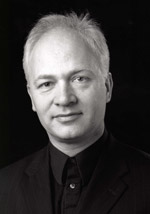Embracing my new role as AFC’s blog guy, I was able to steal a few minutes of Robert Pinsky’s time, between our first rehearsal and his cab ride out, to do a quick interview. He’ll be joining us this Friday in Jordan Hall, reciting Richard Dehmel’s “Transfigured Night” and narrating Jean Francaix’s Gargantua, in a new translation by Laura Marris.
MU: First off, any thoughts on reading other people’s poetry, versus reading your own. I’m guessing that most of what you end up reading is your own work.
RP: Well, you know, I did a very significant project, in my opinion, the Favorite Poem Project. And if you go to favoritepoem.org you’ll hear a construction worker reading Walt Whitman, you’ll hear a glass blower read a Frank O’Hara poem, a Cambodian-American immigrant in San Jose read a Langston Hughes Poem, “Minstrel Man." It’s not about poets or actors reading poetry, it’s not about performance in the sense of an audience, and it’s not about the instrument of the poet being the poet’s voice. The poet writes with that instrument, but the poet writes for the reader’s voice, so it’s for each reader imagining what’s there. The poem is something that happens… like a piece of music.
MU: It’s a shared experience then, in that way.
RP: Yes, and there’s always a collaboration between the composer, or poet, and the person, perhaps thousands of miles away, perhaps not born yet, whoever that person is who reads the poem and gives voice to the poem.
MU: What do you think, then, of the text we’ve inflicted upon you, Gargantua?
RP: Well I’m interested in comedy and in humanism, and Rabelais was a great humanist and a great scholar. It’s not just about toilet talk; it’s not just about sex or absurdity. When he deflates the jargon-ridden pedants of the Sorbonne, he’s saying something very serious about art and knowledge, and it’s a very cleansing laughter. So, for me, it’s not a stretch at all to admire the Rabelais, and to enjoy reading the Rabelais in Laura Marris’s wonderful translation.
MU: It is wonderful! And as a French speaker myself, having gotten to know both versions, the puzzles she was able to solve were impressive. What can you say about Laura?
RP: She was a student in BU’s very small, very selective MFA program in creative writing. She was my student for two or three years and she helped me with my MOOC, The Order of Poetry. She’s a brilliant young poet, a great teacher. And she knows French very well, she’s written about French culture and poetry.
MU: What are your thoughts about working with musicians? You can be honest.
RP: I’m a frustrated musician. I wanted to be a musician. In my high school graduating class, I was not voted most literate boy, definitely not most successful boy. I was voted most musical boy. My identity was playing the saxophone, and it helped me a lot through difficult years. I would be a professional musician today except for the single obstacle of a deficiency of talent.
MU: Do you have a heroes specific to the saxophone? Musical heroes?
RP: I admire Dexter Gordon very much. I would say if I had to pick one I’d pick Dexter. I was fascinated by the fact that there were Jewish saxophone players: Lee Konitz, Stan Getz on the tenor, Zoot Sims.
MU: We had an awesome experience last year doing Stan Getz’s old album Focus, with Harry Allen.
RP: That's great! You know, I do this too; I have two CDs with Laurence Hobgood, who used to be the music director for Kurt Elling. Our new one is called “House Hour,” it’s from my poems, and I always say I’m a non-singing vocalist. We’ll be at the Regatta Bar next month.
MU: I literally wrote these questions during my lunch break…
RP: You’re doing fine!
MU: but… road trippin’ soundtrack?
RP: Well, driving back from the Cape with two cats complaining a little bit in the back seat, we put on – again reeds – we put on the Mozart Clarinet Quintet, and I had a sense that even the cats calmed down a bit hearing that beautiful music. So, you never know. Another time on that same trip it was Jimmy Scott.


 A Far Cry has collaborated with a handful of fabulous flute and piano soloists, but until this point, never have we worked with a string soloist from outside the band. It is such an incredible honor for me to have my mentor and teacher, Roger Tapping, joining us as viola soloist for Britten’s Lachrymae on this cycle.
A Far Cry has collaborated with a handful of fabulous flute and piano soloists, but until this point, never have we worked with a string soloist from outside the band. It is such an incredible honor for me to have my mentor and teacher, Roger Tapping, joining us as viola soloist for Britten’s Lachrymae on this cycle. I spent 7 consecutive summers at the
I spent 7 consecutive summers at the 